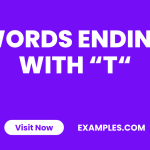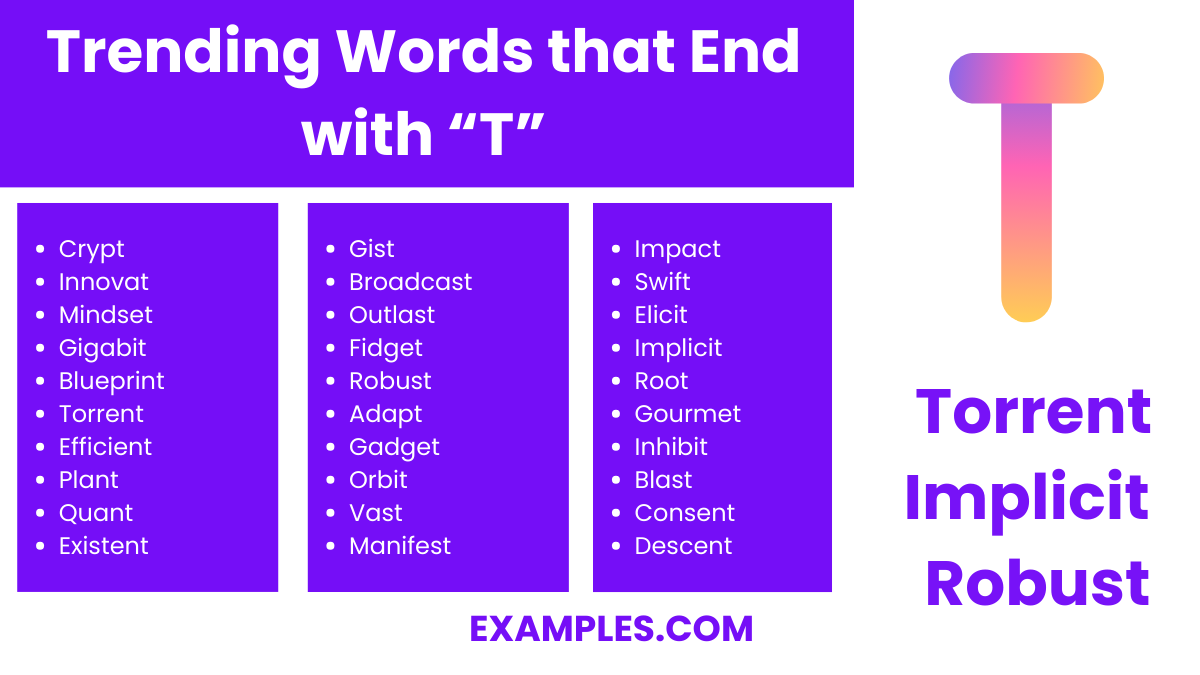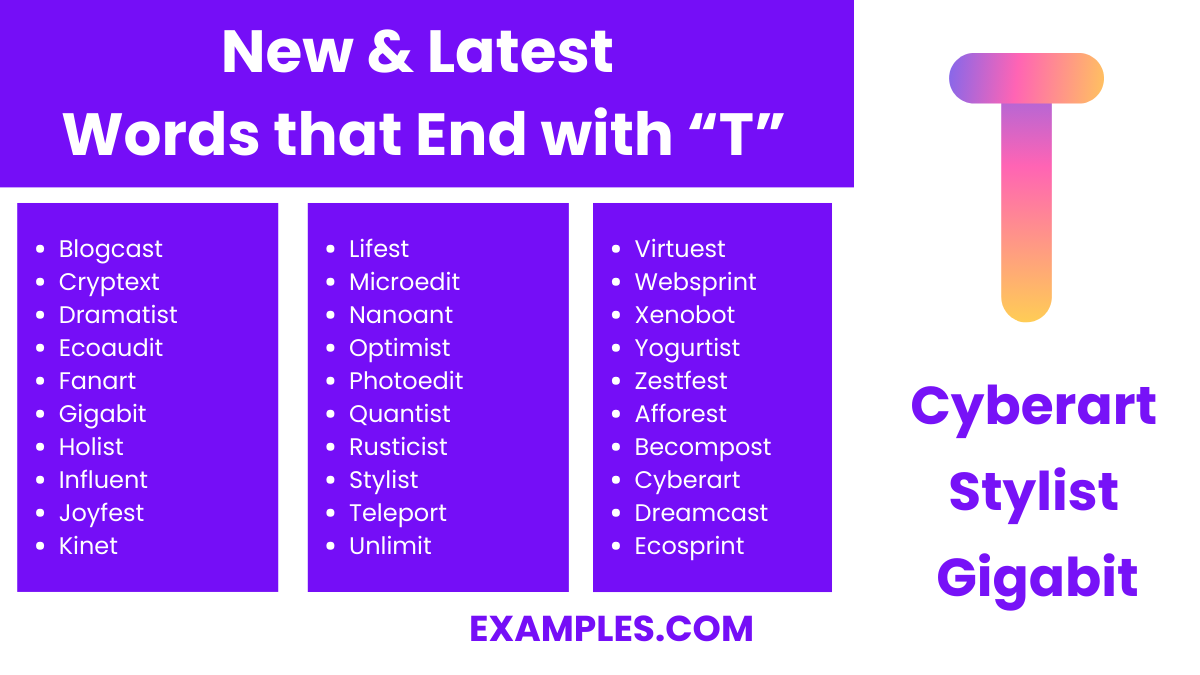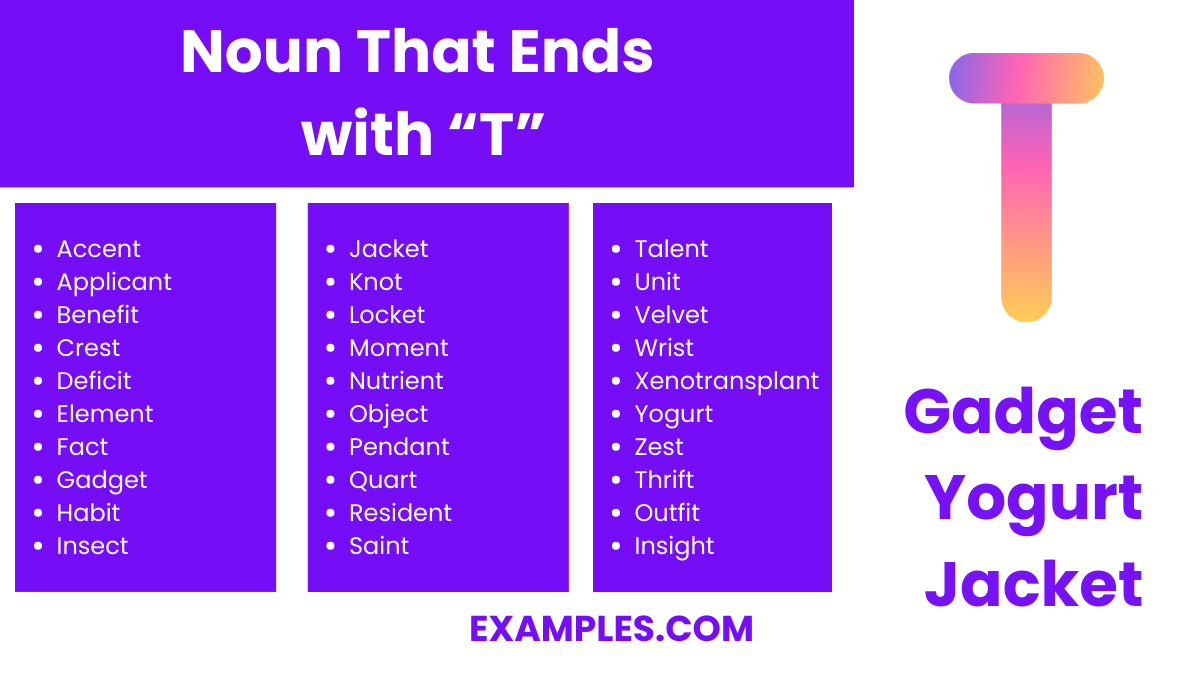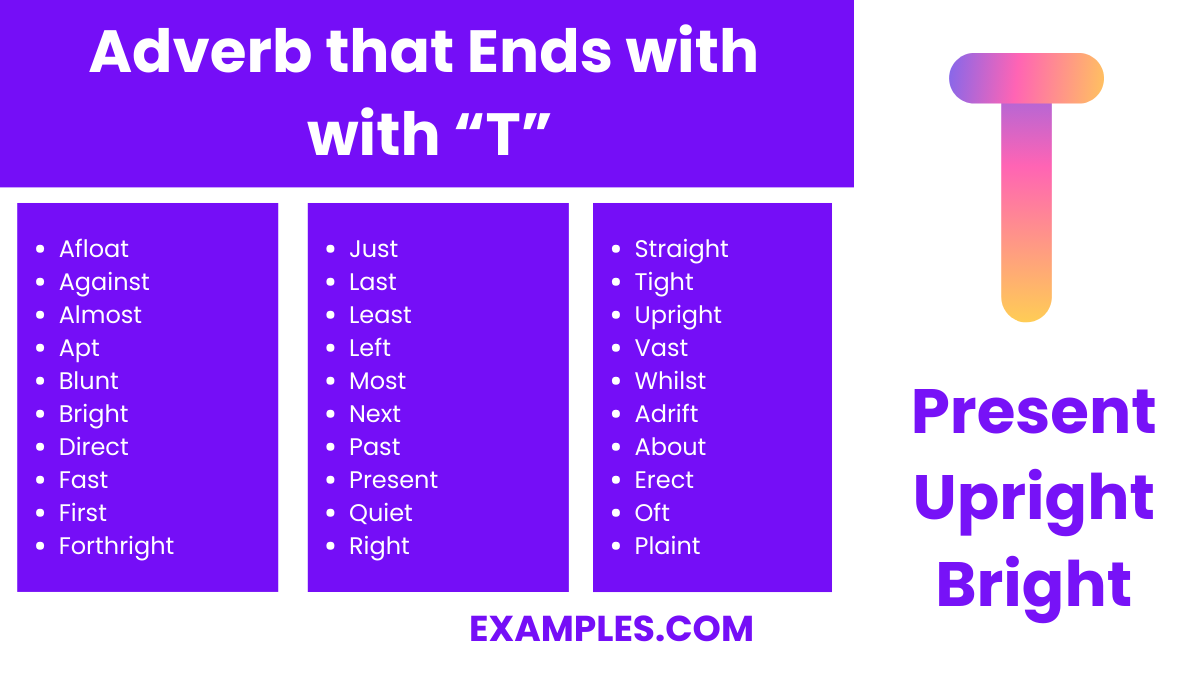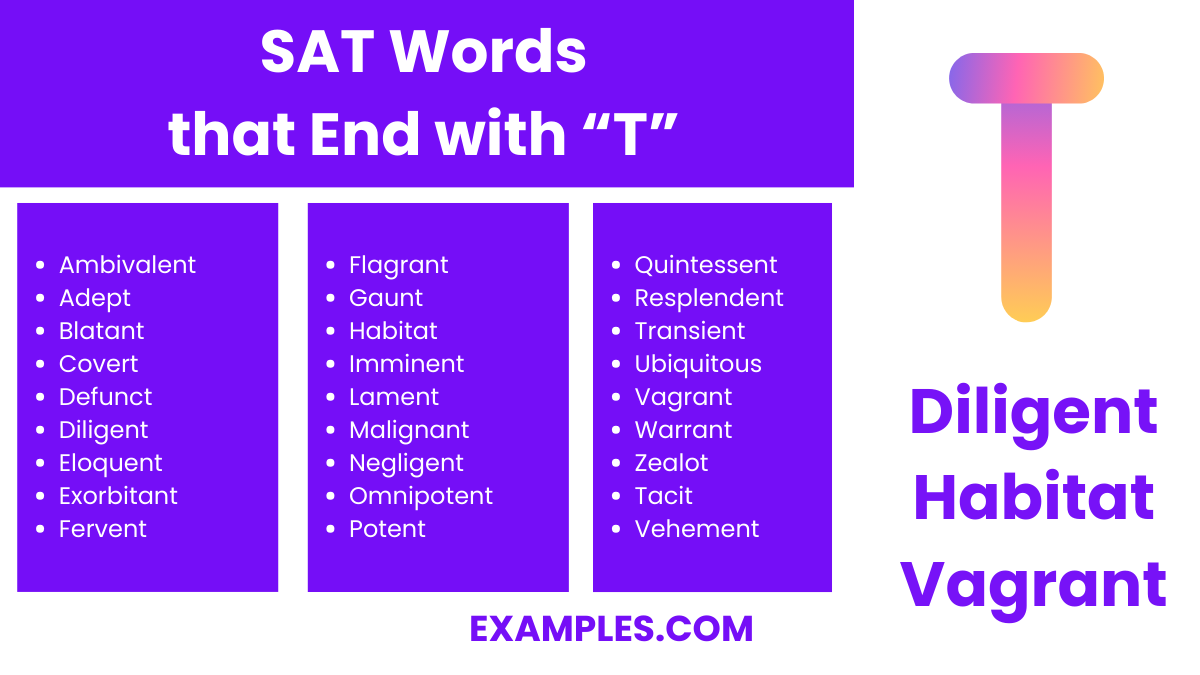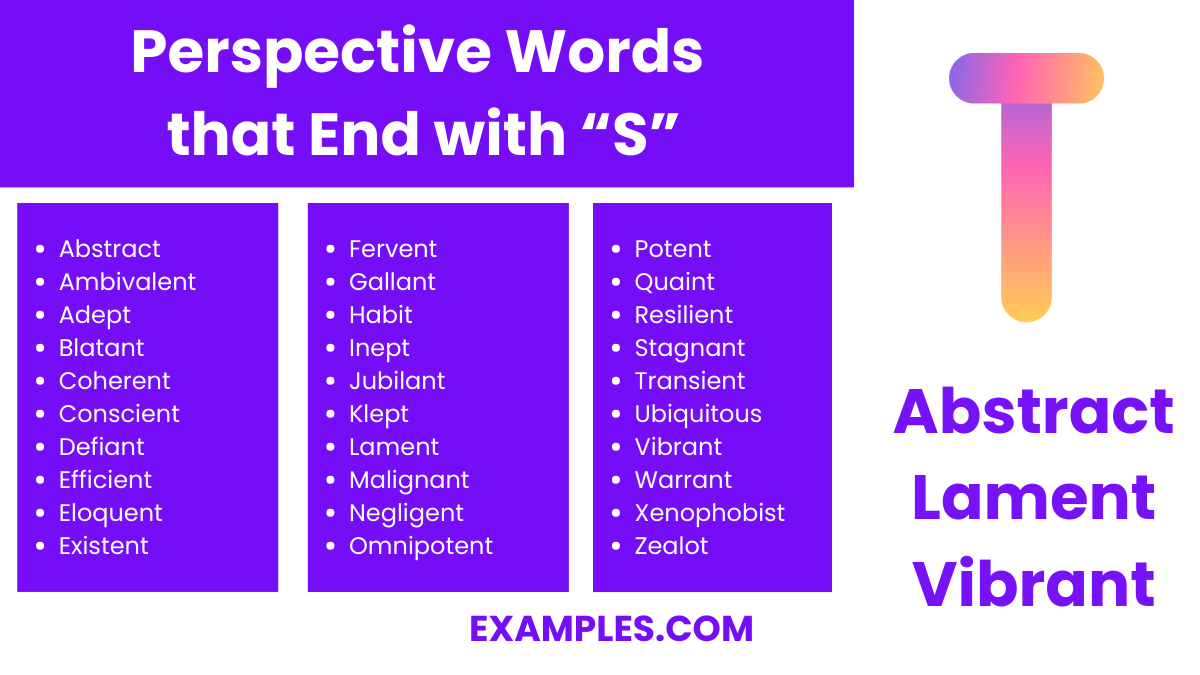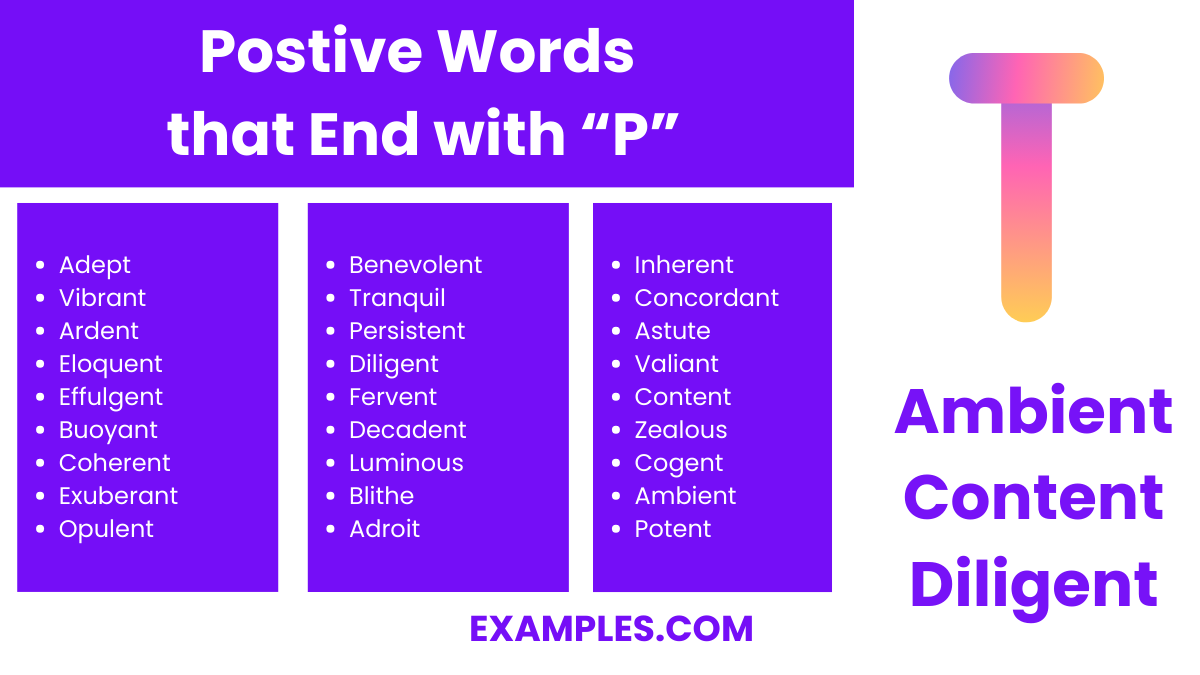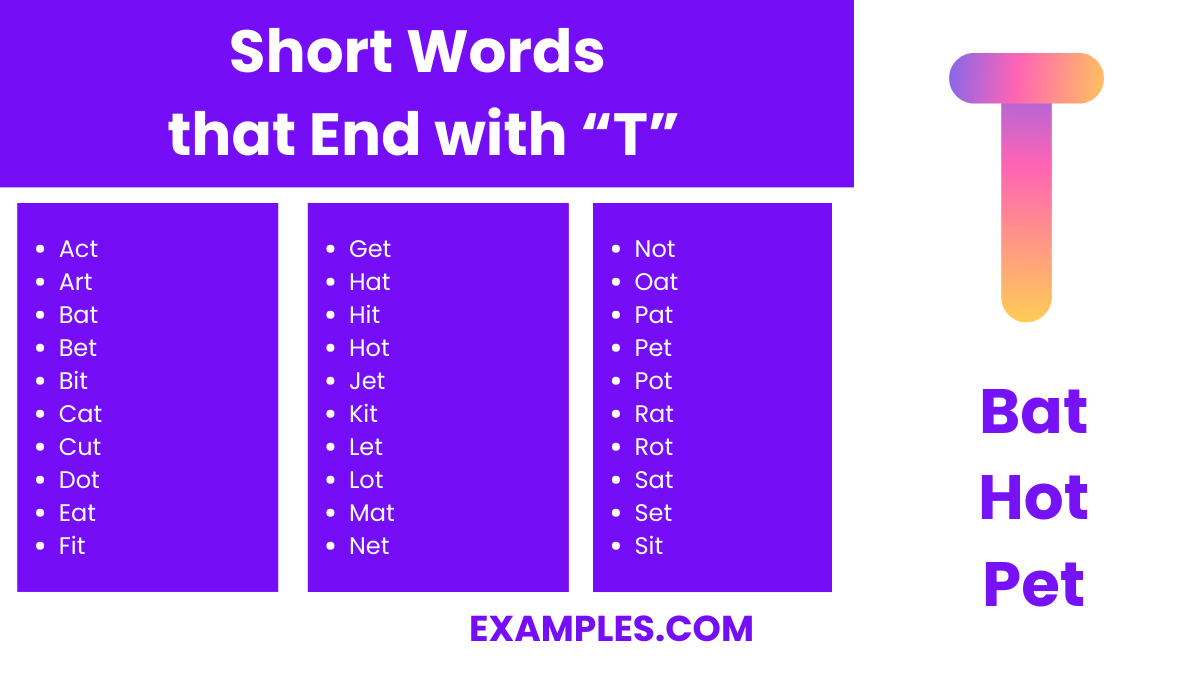Words that end with the letter ‘T’ embody a fascinating segment of the English lexicon, offering a diverse range of expressions from actions to states of being. This characteristic ending lends itself to a variety of words, from verbs in their past tense form, illustrating completed actions, to adjectives and nouns that describe qualities or objects. For educators and language enthusiasts, delving into ‘T’ words ending presents an opportunity to explore the rich tapestry of English vocabulary. This exploration not only enhances linguistic understanding but also broadens communicative abilities, making it an essential endeavor for those looking to deepen their engagement with the language. Here, we embark on a journey through words that end with ‘T’, uncovering their meanings and uses in everyday language.
Download Most Commonly Used Word Ending with T - PDF
150 Most Commonly Used Words Ending with “T”
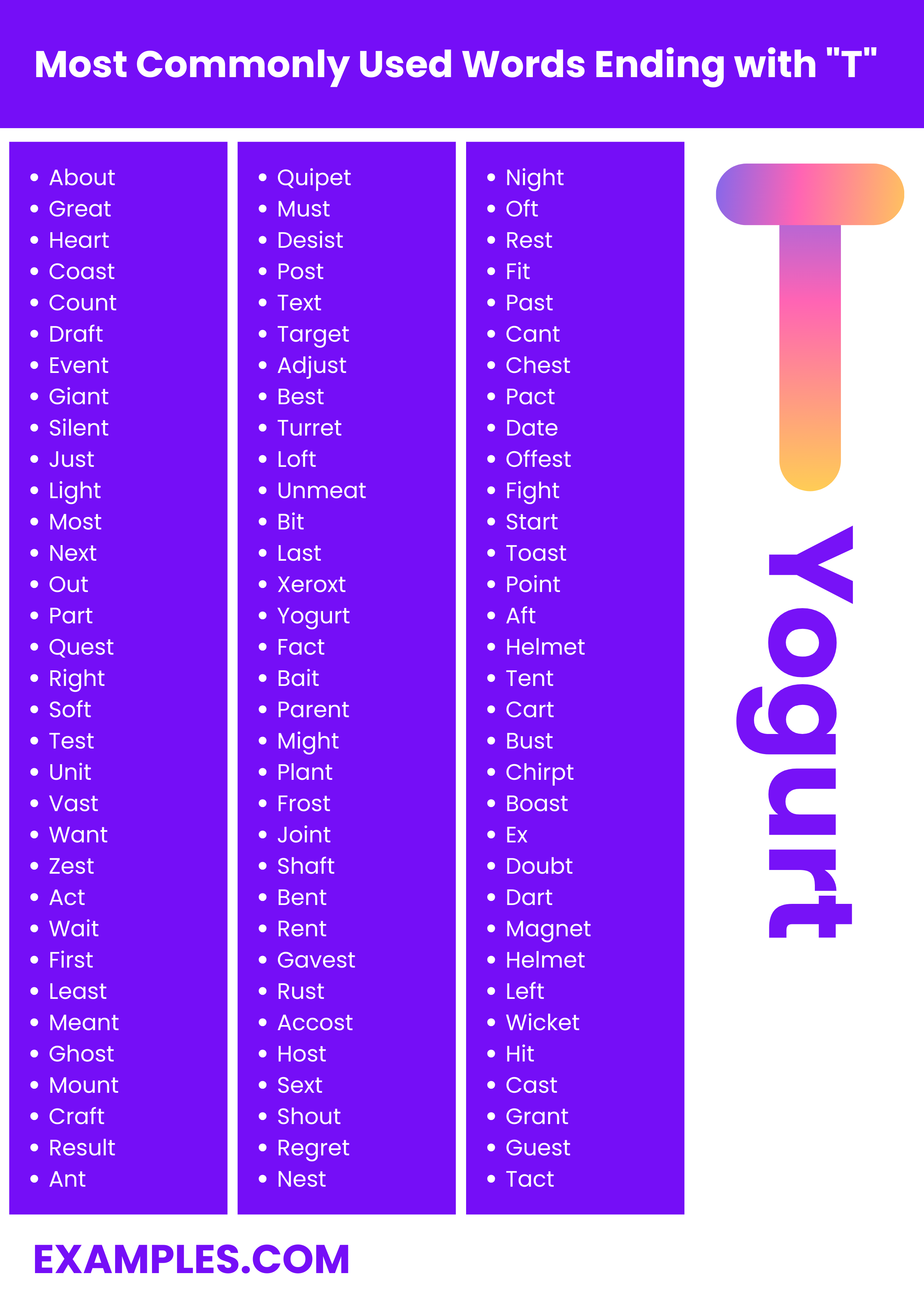 In English, particularly words that terminate with ‘T,’ is fundamental for educators. These words permeate various academic disciplines, from mathematics and science to literature, underpinning key concepts and ideas. Proficiency in these terms can significantly bolster students’ understanding and articulation in English, rendering this compilation an indispensable asset for teachers keen on enriching their students’ lexical range. The assortment provided here, organized in a tabular format for ease of reference, spans six columns, encompassing 150 distinct words. This diversity ensures a comprehensive vocabulary enhancement, catering to Daily Use English Words and singular & plural words, thereby serving as a pivotal resource for crafting engaging lesson plans, conducting effective vocabulary drills, and fostering linguistic growth in the educational milieu.
In English, particularly words that terminate with ‘T,’ is fundamental for educators. These words permeate various academic disciplines, from mathematics and science to literature, underpinning key concepts and ideas. Proficiency in these terms can significantly bolster students’ understanding and articulation in English, rendering this compilation an indispensable asset for teachers keen on enriching their students’ lexical range. The assortment provided here, organized in a tabular format for ease of reference, spans six columns, encompassing 150 distinct words. This diversity ensures a comprehensive vocabulary enhancement, catering to Daily Use English Words and singular & plural words, thereby serving as a pivotal resource for crafting engaging lesson plans, conducting effective vocabulary drills, and fostering linguistic growth in the educational milieu.
| About | First | Parent | Offest | Mintet | Locket |
| Great | Least | Might | Fight | Sight | Kidlet |
| Heart | Meant | Plant | Start | Spent | Apart |
| Coast | Ghost | Frost | Toast | Incest | Jettet |
| Count | Mount | Joint | Point | Faint | Paint |
| Draft | Craft | Shaft | Aft | Gift | Lift |
| Event | Result | Bent | Helmet | Sent | Forent |
| Giant | Ant | Rent | Tent | Went | Scent |
| Silent | Quipet | Gavest | Cart | Exeget | Smart |
| Just | Must | Rust | Bust | Dust | Crust |
| Light | Desist | Accost | Chirpt | Intent | Dampet |
| Most | Post | Host | Boast | Turret | Roast |
| Next | Text | Sext | Ex | Hex | Flex |
| Out | Target | Shout | Doubt | Pout | Scout |
| Part | Adjust | Regret | Dart | Brevet | Chart |
| Quest | Best | Nest | Magnet | Format | Distet |
| Right | Turret | Night | Helmet | Tight | Upbeat |
| Soft | Loft | Oft | Left | Cleft | Theft |
| Test | Unmeat | Rest | Wicket | West | Vignet |
| Unit | Bit | Fit | Hit | Kit | Lit |
| Vast | Last | Past | Cast | Fast | Mast |
| Want | Xeroxt | Cant | Grant | Slant | |
| Zest | Yogurt | Chest | Guest | Jest | Zealot |
| Act | Fact | Pact | Tact | Tract | React |
| Wait | Bait | Date | Fate | Gate | Hate |
Most Trending Words that End with “T”
The English language, we encounter words that, due to their relevance to cultural movements, technological innovation, or the digital zeitgeist, rise to prominence. For educators, keeping pace with these emerging terms, particularly those culminating in ‘T’, is not just beneficial for maintaining rapport with students; it’s pivotal for expanding their linguistic repertoire. Delving into this specific subset reveals words that mirror the diverse facets of modern life, from tech buzzwords to environmental lexicon and the latest vernacular. This curated list, replete with Rhyming Words to aid in memory retention and Christmas Words to season lessons with festive spirit, stands as a crucial tool for educators dedicated to fostering a learning space that resonates with the contemporary lexicon.
- Crypt – A hidden or secret place.
- Innovat – A shortened slang for ‘innovate’, often used in tech circles.
- Mindset – A person’s way of thinking and their opinions.
- Gigabit – A unit of digital information, commonly used in computing.
- Blueprint – A detailed plan or design of something.
- Torrent – A strong and fast-moving stream of water or other liquid.
- Efficient – Achieving maximum productivity with minimum wasted effort.
- Plant – To put a seed or plant in the ground so that it can grow.
- Quant – Short for quantitative, often used in finance and research.
- Existent – Having being or existence.
- Gist – The substance or essence of a speech or text.
- Broadcast – Transmit (a program or some information) by radio or television.
- Outlast – Last longer than; endure longer than.
- Fidget – Make small movements, especially of the hands and feet, through nervousness.
- Robust – Strong and healthy; vigorous.
- Adapt – Make something suitable for a new use or purpose; modify.
- Gadget – A small mechanical or electronic device or tool.
- Orbit – The curved path of a celestial object or spacecraft around a star, planet, or moon.
- Vast – Of very great extent or quantity; immense.
- Manifest – Display or show (a quality or feeling) by one’s acts or appearance.
- Impact – The action of one object coming forcibly into contact with another.
- Swift – Happening quickly or promptly.
- Elicit – Evoke or draw out (a response or fact) from someone.
- Implicit – Implied though not plainly expressed.
- Root – The part of a plant that attaches it to the ground or to a support.
- Gourmet – A connoisseur of good food; a person with a discerning palate.
- Inhibit – Hinder, restrain, or prevent (an action or process).
- Blast – A strong gust of wind or air.
- Consent – Permission for something to happen or agreement to do something.
- Descent – An action of moving downward, dropping, or falling.
New & Latest Added Words that End with “T”
In the ever-changing world of the English language, it’s essential for educators to stay abreast of the latest linguistic developments. The language continually evolves, absorbing influences from culture, technology, and societal shifts, which often result in the introduction of new vocabulary. A particularly interesting area of growth involves words that conclude with the letter “T.” These additions not only enrich our collective vocabulary but also provide educators with new avenues for teaching expression and comprehension. For those dedicated to enhancing their students’ language abilities, this collection of 30 recent words ending in “T” serves as an invaluable asset. Including Dictation Words can strengthen spelling and listening skills, while Encouraging Words motivate and uplift, making this list an essential tool for expanding educational content and fostering a positive learning environment.
- Blogcast – A broadcast of a blog.
- Cryptext – Text that is encrypted.
- Dramatist – A person who writes plays.
- Ecoaudit – An environmental assessment.
- Fanart – Art created by fans of a work.
- Gigabit – A measure of digital information.
- Holist – An advocate of holism.
- Influent – Exercising influence.
- Joyfest – A festival celebrating happiness.
- Kinet – Relating to motion.
- Lifest – Pertaining to lifestyle.
- Microedit – To edit on a small scale.
- Nanoant – A very small robot.
- Optimist – A person who is hopeful and confident.
- Photoedit – Edit a photograph.
- Quantist – Specialist in quantum mechanics.
- Rusticist – Advocate of rural life.
- Stylist – A person with an elegant style.
- Teleport – To transport across space.
- Unlimit – To remove limits from.
- Virtuest – Possessing virtues.
- Websprint – Fast internet browsing.
- Xenobot – A robot designed for foreign environments.
- Yogurtist – A maker of yogurt.
- Zestfest – A festival celebrating enthusiasm.
- Afforest – To convert into a forest.
- Becompost – To turn into compost.
- Cyberart – Art created using digital technology.
- Dreamcast – To envision or dream.
- Ecosprint – A rapid ecological action.
Noun That Ends with “T”
Nouns concluding with the letter “t” span a broad spectrum of meanings, playing a crucial role in enriching English vocabulary. These terms cover a variety of subjects, from tangible objects to abstract concepts, offering a rich tapestry for linguistic exploration. For educators seeking to enhance their teaching repertoire and students eager to deepen their understanding of English, this collection of nouns is invaluable. It serves as a robust resource for broadening vocabulary and enriching communication skills. Engaging with these words can enliven educational content, making learning a more dynamic experience. Incorporating Funny Words can add a touch of humor and light-heartedness to lessons, while Ness Words, which often denote states or qualities, deepen comprehension of nuanced language concepts, making this list a comprehensive tool for linguistic development.
- Accent – Distinctive way of pronouncing words.
- Applicant – A person who applies for something.
- Benefit – An advantage or profit gained from something.
- Crest – The peak or highest point, often used in geography.
- Deficit – The amount by which something is too small.
- Element – A part or aspect of something abstract.
- Fact – A piece of information used as evidence.
- Gadget – A small mechanical or electronic device.
- Habit – A regular tendency or practice.
- Insect – A small arthropod animal with six legs.
- Jacket – An outer garment extending either to the waist or hips.
- Knot – A fastening made by tying a piece of string, rope, or something similar.
- Locket – A small ornamental case worn around the neck.
- Moment – A very brief period of time.
- Nutrient – A substance that provides nourishment.
- Object – A material thing that can be seen and touched.
- Pendant – A piece of jewelry that hangs from a chain.
- Quart – A unit of liquid capacity.
- Resident – A person who lives somewhere permanently or on a long-term basis.
- Saint – A person acknowledged as holy or virtuous.
- Talent – Natural aptitude or skill.
- Unit – An individual thing or person regarded as single and complete.
- Velvet – A closely woven fabric of silk, cotton, or nylon.
- Wrist – The joint connecting the hand with the forearm.
- Xenotransplant – A transplant of organs between different species.
- Yogurt – A semi-solid sourish food prepared from milk.
- Zest – Great enthusiasm and energy.
- Thrift – The quality of using money and other resources carefully.
- Outfit – A set of clothes worn together.
- Insight – The capacity to gain an accurate and deep understanding of something.
Adverb That Ends with “T”
Exploring the fascinating world of adverbs, especially those ending with the letter ‘T’, can significantly enhance your understanding and mastery of English. Adverbs words play a crucial role in adding depth to our language, offering nuances to verbs, adjectives, or other adverbs. Particularly, adverbs ending with ‘T’ offer a unique flavor to sentences, often implying intensity, manner, or frequency. These words are instrumental for teachers and educators aiming to enrich their students’ vocabulary and linguistic skills. Understanding these adverbs is vital for effective communication and comprehension in English, making them a key component in language education.
- Afloat – Floating in water; not sinking.
- Against – In opposition to.
- Almost – Not quite; very nearly.
- Apt – Appropriately; fittingly.
- Blunt – In a direct, straightforward manner.
- Bright – With brightness or vividness.
- Direct – In a direct line or manner; straightforwardly.
- Fast – Quickly; at high speed.
- First – Before anything else; initially.
- Forthright – Directly; straightforwardly.
- Just – Exactly; precisely.
- Last – After all others; at the end.
- Least – To the smallest extent or degree.
- Left – On or towards the left side.
- Most – To the greatest extent.
- Next – Immediately following.
- Past – So as to pass by or beyond.
- Present – At the current moment; now.
- Quiet – With little or no sound; silently.
- Right – Correctly; properly.
- Straight – In a straight line; directly.
- Tight – Firmly; securely.
- Upright – In a vertical position; straight up.
- Vast – To a very great extent; immensely.
- Whilst – While; at the same time as.
- Adrift – Floating without being steered; aimlessly.
- About – Imprecise but fairly close to correct.
- Erect – In an upright position.
- Oft – Often; frequently.
- Plaint – Clearly or openly.
Adjective That Ends with “T”
Adjectives ending with the letter “t” play an integral role in English, adding descriptive nuance and depth to our communication. These specific adjectives enrich both spoken and written narratives, providing clarity and vibrancy. For educators dedicated to enhancing their students’ vocabulary, this compilation of adjectives that terminate in “t” is an invaluable tool. It’s designed not only to aid English language learners in their linguistic journey but also to offer native speakers an opportunity to delve deeper into the intricacies of their language. This article presents 30 carefully selected adjectives ending in “t,” each accompanied by a definition to facilitate understanding and practical application in various contexts. Incorporating Praising Words can uplift and motivate, while focusing on Vowel Words highlights the phonetic diversity of English, making this resource a comprehensive guide for expanding linguistic proficiency.
- Ambivalent: Having mixed feelings or contradictory ideas about something or someone.
- Ardent: Very enthusiastic or passionate.
- Coherent: Logical and consistent.
- Defiant: Showing defiance, bold disobedience.
- Diligent: Having or showing care and conscientiousness in one’s work or duties.
- Eloquent: Fluent or persuasive in speaking or writing.
- Exuberant: Filled with or characterized by a lively energy and excitement.
- Flagrant: (Of something considered wrong or immoral) conspicuously or obviously offensive.
- Fragrant: Having a pleasant or sweet smell.
- Gaunt: (Of a person) lean and haggard, especially because of suffering, hunger, or age.
- Implicit: Implied though not plainly expressed.
- Inept: Having or showing no skill; clumsy.
- Jubilant: Feeling or expressing great happiness and triumph.
- Latent: (Of a quality or state) existing but not yet developed or manifest; hidden or concealed.
- Malignant: (Of a disease) very virulent or infectious.
- Negligent: Failing to take proper care in doing something.
- Omnipotent: Having unlimited power; able to do anything.
- Pertinent: Relevant or applicable to a particular matter; apposite.
- Quaint: Attractively unusual or old-fashioned.
- Relevant: Closely connected or appropriate to what is being done or considered.
- Stoic: Enduring pain and hardship without showing one’s feelings or complaining.
- Transient: Lasting only for a short time; impermanent.
- Ubiquitous: Present, appearing, or found everywhere.
- Vehement: Showing strong feeling; forceful, passionate, or intense.
- Warrant: Justify or necessitate (a certain course of action).
- Zealot: A person who is fanatical and uncompromising in pursuit of their religious, political, or other ideals.
- Abhorrent: Inspiring disgust and loathing; repugnant.
- Benevolent: Well-meaning and kindly.
- Cohescent: Tending to unite or hold together.
- Dormant: Having normal physical functions suspended or slowed down for a period; in or as if in a deep sleep.
Phrasal Verbs That End with “T”
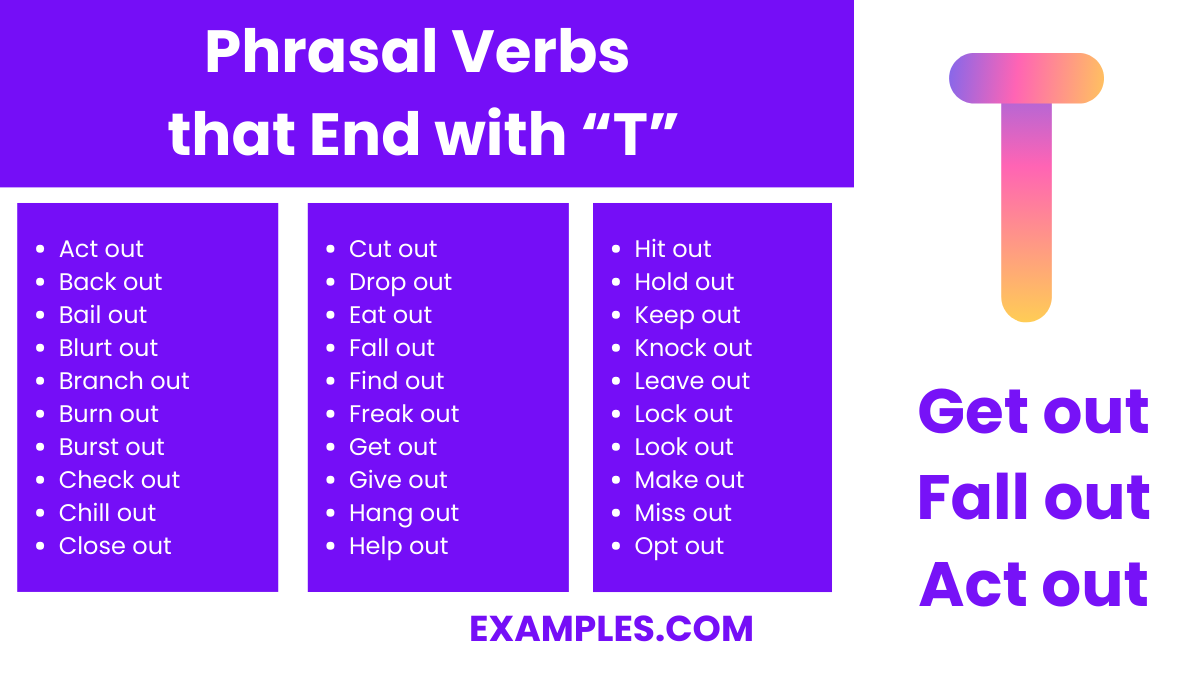
Phrasal verbs, which pair a verb with a preposition or adverb to create a new meaning, are essential in mastering English, especially for ESL learners. Among these, phrasal verbs that conclude with ‘T’ present an intriguing study due to their unique structure and impactful change in meaning. For educators aiming to deepen their students’ grasp of English grammar and enrich their vocabulary, focusing on these phrasal verbs can be particularly beneficial. Gaining proficiency in these expressions can markedly enhance both spoken and written English competencies. This collection, ideal for teaching purposes, includes phrasal verbs ending in ‘T,’ each selected for its relevance and frequency of use. Understanding these phrasal verbs, along with Compound Words and Sight Words, can significantly aid learners in achieving fluency and confidence in English communication.
- Act out – to perform a narrative through actions and gestures.
- Back out – to withdraw from a commitment or promise.
- Bail out – to rescue someone from a difficult situation.
- Blurt out – to say something suddenly and without careful consideration.
- Branch out – to expand or extend one’s interests or activities.
- Burn out – to become extremely tired or sick by working hard.
- Burst out – to suddenly say something loudly and impulsively.
- Check out – to investigate or examine something.
- Chill out – to relax or take time to unwind.
- Close out – to conclude or finish something.
- Cut out – to remove something using scissors or another tool.
- Drop out – to quit a course, school, or group.
- Eat out – to have a meal in a restaurant instead of at home.
- Fall out – to have a disagreement that ends a relationship.
- Find out – to discover or become aware of information.
- Freak out – to react very strongly to something, often in a negative way.
- Get out – to leave or escape from a place.
- Give out – to distribute something to a group of people.
- Hang out – to spend time relaxing or socializing.
- Help out – to assist or aid someone.
- Hit out – to criticize someone or something strongly.
- Hold out – to resist or survive in difficult circumstances.
- Keep out – to prevent someone from entering a place.
- Knock out – to defeat someone in a competition or contest.
- Leave out – to exclude someone or something.
- Lock out – to prevent someone from entering a building by locking the doors.
- Look out – to be watchful or careful.
- Make out – to see, hear, or understand something or someone with difficulty.
- Miss out – to fail to include or experience something.
- Opt out – to choose not to participate in something.
Describing Words That End with “T”
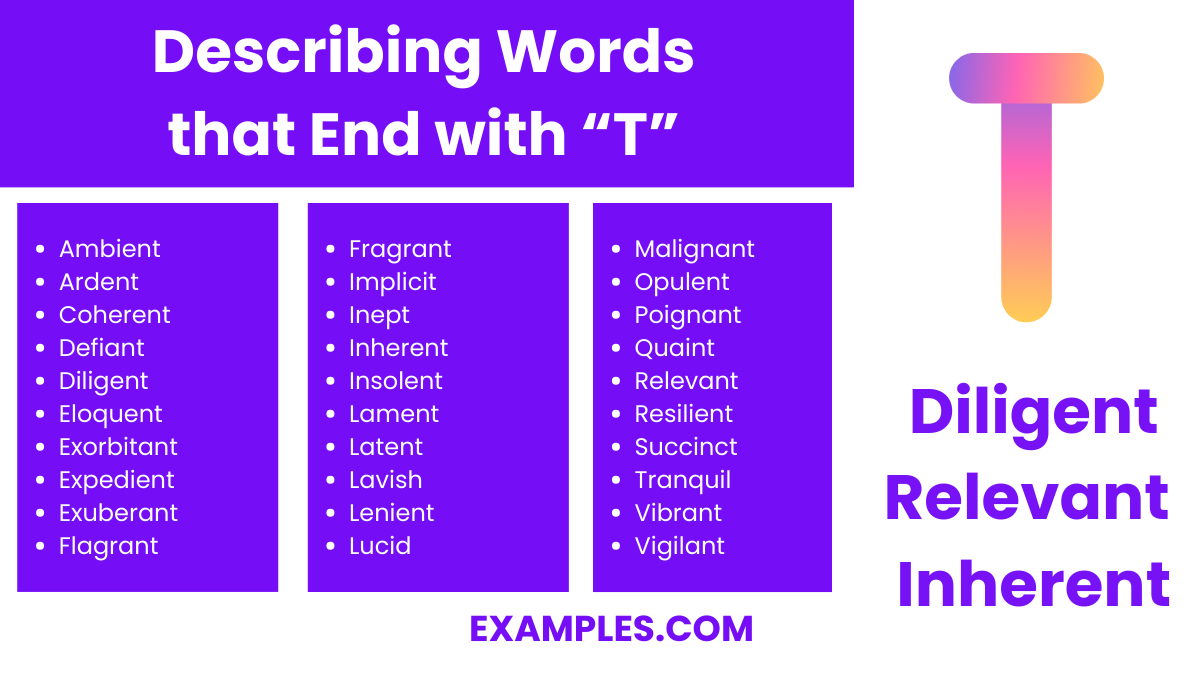
Describing words, also known as adjectives, play a crucial role in the English language. They add specificity and detail to sentences, enhancing the reader’s understanding. Particularly, adjectives that end with the letter ‘T’ are numerous and varied, offering a wide range of descriptive possibilities. These words can describe qualities, states, and characteristics of nouns, making them indispensable in both spoken and written English. For educators and teachers, understanding and teaching these words is vital for enriching students’ vocabulary. By incorporating these adjectives into lessons or educational materials, teachers can significantly improve the descriptive abilities of their students. This list of 30 describing words ending with ‘T’ is not only a valuable resource for lesson planning but also serves as a reference guide for students to expand their descriptive vocabulary.
- Ambient – relating to the immediate surroundings of something.
- Ardent – very enthusiastic or passionate.
- Coherent – logical and consistent.
- Defiant – showing defiance.
- Diligent – having or showing care and conscientiousness in one’s work or duties.
- Eloquent – fluent or persuasive in speaking or writing.
- Exorbitant – (of a price or amount charged) unreasonably high.
- Expedient – (of an action) convenient and practical, although possibly improper or immoral.
- Exuberant – filled with or characterized by a lively energy and excitement.
- Flagrant – (of something considered wrong or immoral) conspicuously or obviously offensive.
- Fragrant – having a pleasant or sweet smell.
- Implicit – implied though not plainly expressed.
- Inept – having or showing no skill; clumsy.
- Inherent – existing in something as a permanent, essential, or characteristic attribute.
- Insolent – showing a rude and arrogant lack of respect.
- Lament – a passionate expression of grief or sorrow.
- Latent – (of a quality or state) existing but not yet developed or manifest; hidden or concealed.
- Lavish – sumptuously rich, elaborate, or luxurious.
- Lenient – (of punishment or a person in authority) permissive, merciful, or tolerant.
- Lucid – expressed clearly; easy to understand.
- Malignant – (of a disease) very virulent or infectious.
- Opulent – ostentatiously rich and luxurious or lavish.
- Poignant – evoking a keen sense of sadness or regret.
- Quaint – attractively unusual or old-fashioned.
- Relevant – closely connected or appropriate to what is being done or considered.
- Resilient – able to withstand or recover quickly from difficult conditions.
- Succinct – briefly and clearly expressed.
- Tranquil – free from disturbance; calm.
- Vibrant – full of energy and life.
- Vigilant – keeping careful watch for possible danger or difficulties.
- Zealot – a person who is fanatical and uncompromising in pursuit of their religious, political, or other ideals.
- Quaint – attractively unusual or old-fashioned.
- Robust – strong and healthy; vigorous.
- Covert – not openly acknowledged or displayed.
- Omnipotent – having unlimited power; able to do anything.
SAT Words That End with “T”
Preparing for the SAT requires a broad vocabulary, particularly words with specific endings. Understanding words that end in “T” can enhance students’ comprehension and expression, crucial for excelling in the SAT words. This list is tailored for teachers aiding students in SAT preparation, providing a diverse set of words ending in ‘T’ along with their meanings. These words have been carefully selected to enrich students’ vocabulary, improve their reading and writing skills, and bolster their confidence in tackling the SAT. Incorporating these words into teaching methods can significantly aid students in their SAT journey.
- Ambivalent: Having mixed feelings or contradictory ideas about something or someone.
- Adept: Very skilled or proficient at something.
- Blatant: Done openly and unashamedly; completely lacking in subtlety.
- Covert: Not openly acknowledged or displayed.
- Defunct: No longer existing or functioning.
- Diligent: Having or showing care and conscientiousness in one’s work or duties.
- Eloquent: Fluent or persuasive in speaking or writing.
- Exorbitant: (of a price or amount charged) unreasonably high.
- Fervent: Having or displaying a passionate intensity.
- Flagrant: (of something considered wrong or immoral) conspicuously or obviously offensive.
- Gaunt: Lean and haggard, especially because of suffering, hunger, or age.
- Habitat: The natural home or environment of an animal, plant, or other organism.
- Imminent: About to happen.
- Lament: A passionate expression of grief or sorrow.
- Malignant: (of a disease) very virulent or infectious.
- Negligent: Failing to take proper care in doing something.
- Omnipotent: Having unlimited power; able to do anything.
- Potent: Having great power, influence, or effect.
- Quintessent: Representing the most perfect or typical example of a quality or class.
- Resplendent: Attractive and impressive through being richly colorful or sumptuous.
- Transient: Lasting only for a short time; impermanent.
- Vagrant: A person without a settled home or regular work who wanders from place to place and lives by begging.
- Warrant: Justify or necessitate (a certain course of action).
- Zealot: A person who is fanatical and uncompromising in pursuit of their religious, political, or other ideals.
- Tacit: Understood or implied without being stated.
- Vehement: Showing strong feeling; forceful, passionate, or intense.
- Quaint: Attractively unusual or old-fashioned.
Perspective Words Ending with “T”
Perspective words ending in “t” bring depth and clarity to language, shaping our understanding and expression. These words are invaluable for educators striving to enrich their students’ vocabulary and enhance their comprehension skills. By delving into this particular set of words, teachers can illuminate the intricate layers of language, encouraging students to appreciate its richness and versatility. Such an exploration not only refines students’ writing and verbal communication but also expands their linguistic arsenal. Here, we’ve compiled a list of 30 perspective words that conclude with “t.” Each entry is highlighted in bold and accompanied by its definition, serving as a comprehensive resource for educators to leverage in teaching nuanced language concepts. This list, including Pictionary Words, can serve as a creative tool for interactive learning, fostering a deeper engagement with language and its subtleties.
- Abstract – Existing in thought or as an idea but not having a physical existence.
- Ambivalent – Having mixed feelings or contradictory ideas about something or someone.
- Adept – Very skilled or proficient at something.
- Blatant – Done openly and unashamedly; completely lacking in subtlety.
- Coherent – Logical and consistent.
- Conscient – Being aware of and responding to one’s surroundings; awake.
- Defiant – Showing open resistance; bold disobedience.
- Efficient – Achieving maximum productivity with minimum wasted effort or expense.
- Eloquent – Fluent or persuasive in speaking or writing.
- Existent – Having objective reality or being.
- Fervent – Having or displaying a passionate intensity.
- Gallant – Brave; heroic.
- Habit – A settled or regular tendency or practice.
- Inept – Having or showing no skill; clumsy.
- Jubilant – Feeling or expressing great happiness and triumph.
- Klept – Relating to theft or stealing.
- Lament – A passionate expression of grief or sorrow.
- Malignant – Very virulent or infectious.
- Negligent – Failing to take proper care in doing something.
- Omnipotent – Having unlimited power; able to do anything.
- Potent – Having great power, influence, or effect.
- Quaint – Attractively unusual or old-fashioned.
- Resilient – Able to withstand or recover quickly from difficult conditions.
- Stagnant – Showing no activity; dull and sluggish.
- Transient – Lasting only for a short time; impermanent.
- Ubiquitous – Present, appearing, or found everywhere.
- Vibrant – Full of energy and enthusiasm.
- Warrant – Justify or necessitate (a certain course of action).
- Xenophobist – Person having a dislike of or prejudice against people from other countries.
- Zealot – A person who is fanatical and uncompromising in pursuit of their religious, political, or other ideals.
Positive Words that Ends with “T”
In the English language, words carry immense power, especially those with a positive connotation. For teachers aiming to inspire and educate, the choice of words is crucial. Positive words ending in “T” are not only phonetically pleasing but also carry significant, uplifting meanings. These words can be used in various educational settings, from encouraging students in classrooms to crafting motivational content. Let’s explore some of these words, delving into their meanings to better understand their positive impact. This exploration will not only enrich vocabulary but also offer a valuable tool for teachers to create an optimistic and encouraging environment in their educational endeavors.
- Adept – Highly skilled or proficient.
- Vibrant – Full of energy and enthusiasm.
- Ardent – Very enthusiastic or passionate.
- Eloquent – Fluent or persuasive in speaking or writing.
- Effulgent – Shining brightly; radiant.
- Buoyant – Cheerful and optimistic.
- Coherent – Logical and consistent.
- Exuberant – Filled with lively energy and excitement.
- Opulent – Ostentatiously rich and luxurious.
- Benevolent – Well-meaning and kindly.
- Tranquil – Calm and peaceful.
- Persistent – Continuing firmly in a course of action.
- Diligent – Having or showing care in one’s work.
- Fervent – Having or displaying passionate intensity.
- Decadent – Luxuriously self-indulgent.
- Luminous – Radiating or reflecting light; shining.
- Blithe – Showing casual and cheerful indifference.
- Adroit – Clever or skillful.
- Inherent – Existing in something as a permanent attribute.
- Concordant – In agreement; harmonious.
- Astute – Having the ability to accurately assess situations.
- Valiant – Possessing courage and determination.
- Content – In a state of peaceful happiness.
- Zealous – Full of zeal; enthusiastic.
- Cogent – Convincing or persuasive.
- Ambient – Relating to the immediate surroundings.
- Potent – Having great power, influence, or effect.
- Affluent – Wealthy and prosperous.
- Succinct – Briefly and clearly expressed.
Short Word that Ends with “T”
Teaching English effectively often involves focusing on vocabulary development. An interesting approach is to explore short words ending with the letter ‘T.’ These words are not only fundamental for language learners but also offer a unique way to expand vocabulary. This article provides a list of such words, ideal for teachers aiming to enhance their teaching methods and students seeking to enrich their vocabulary. Each word is presented in bold, followed by its meaning, making it easier for learners to understand and remember.
- Act – To do something.
- Art – The expression of creativity or imagination.
- Bat – A piece of equipment used in sports or a nocturnal flying mammal.
- Bet – To risk something on the outcome of a contest or uncertain event.
- Bit – A small piece or amount.
- Cat – A small domesticated carnivorous mammal.
- Cut – To divide with a sharp tool.
- Dot – A small round mark.
- Eat – To consume food.
- Fit – Suitable or right for a particular purpose.
- Get – To obtain or receive.
- Hat – A head covering.
- Hit – To come into contact with forcefully.
- Hot – Having a high temperature.
- Jet – A fast aircraft or a strong stream of liquid or gas.
- Kit – A set of articles or equipment.
- Let – To allow or permit.
- Lot – A large amount or number.
- Mat – A piece of protective or decorative fabric.
- Net – A meshed fabric or device for catching things.
- Not – Used to express negation.
- Oat – A cereal plant or its grains.
- Pat – To touch gently as a gesture of affection.
- Pet – A domestic or tamed animal kept for companionship.
- Pot – A container used for cooking or storing.
- Rat – A rodent, typically considered a pest.
- Rot – To decay or cause to decay.
- Sat – Past tense of sit.
- Set – To put or place in a position.
- Sit – To rest in a seated position.
- Vet – A veterinary surgeon or to examine thoroughly.
- Wet – Covered or saturated with water or another liquid.
- Yet – Up until now or a particular time.
- Lit – Past tense of light or illuminated.
- Nut – A hard-shelled fruit or a crazy person (slang).
- Pit – A large hole in the ground.
- Put – To move something to a particular place.
- Rut – A routine or pattern of behavior.
- Tat – Poor quality material or articles.
- Tit – A small bird or a slang term for a woman’s breast.
In conclusion, crafting words ending with ‘T’ can be both fun and educational. To master this, focus on recognizing patterns and sounds. Practice regularly, use a dictionary for unfamiliar words, and incorporate these words into your daily vocabulary. Remember, the key is consistency and curiosity. With these tips, you’ll enhance your language skills and enjoy the beauty of English word formation.



